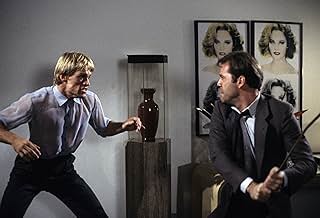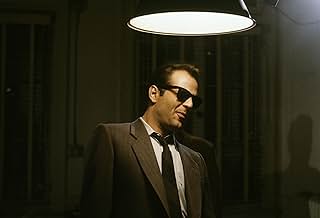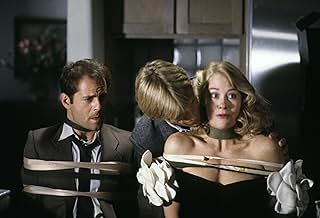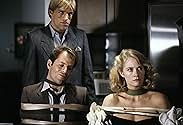Les affaires étranges d'une ancienne mannequin et d'un détective futé, qui gèrent une agence de détective privé.Les affaires étranges d'une ancienne mannequin et d'un détective futé, qui gèrent une agence de détective privé.Les affaires étranges d'une ancienne mannequin et d'un détective futé, qui gèrent une agence de détective privé.
- Récompensé par 6 Primetime Emmys
- 19 victoires et 60 nominations au total
Avis à la une
So much on TV nowadays is either over-the-top dramatic, or toilet humor. No one knows how to just have fun anymore. Moonlighting never forgot that it was just a television show, and it didn't mind poking fun at itself. Some lines that demonstrated this were, "Two teams [...] with the same story. Either someone's lying or the writers just Xeroxed the other scene", and, "What do we do now?" "Wrap this up in about 12 minutes so another show can come on the air."
After David and Maddie got together, then weren't together, then were, how did it end anyway? The show became a bit of a soap opera. But it was always a treat to watch. Everyone mentions Moonlighting's version of "The Taming of the Shrew." Some of my other favorite episodes are "The Bride of Tupperman", which ends with a hospital scene chase to 'Dem Bones, "Symphony in Knocked Flat" (guest appearance by Don King), "Yours Very Deadly" (Burt Viola's first appearance), and both Christmas episodes. And the show wouldn't be complete without the rhymes of Agnes Dipesto. If you aren't that familiar with the show, don't miss your next opportunity to see Moonlighting!
Shepard, who plays Maddie Hayes, wakes up one morning to find out her accountant has absconded with the fortune she made as a high fashion model. Obviously it was not a stretch for Cybil to adapt to this role! In the course of finding out that she needs to sell everything, she happens in on this little detective agency(Blue Moon), she owns only because it was a great tax writeoff. The staff is morabund, and the head sleuth is a wise cracking obnoxious male chauvenist named David Addison, played by an unknown(at the time) Bruce Willis. The immediate rapport between the two brought viewers back for more. The endless stream of double entendre's, malaprops, and overall office antics made the show lovable and audiences craved for more.
Glenn Gordon Caron's writing and vision had the writers, actors, and directors take license with certain rules in primetime that were never questioned. E.G. In one particular episode Maddie asks David to get more explicit with an explanation and David responds by telling her if they get any more explicit they'll have to move the show to cable. It is precisely these departures from the norm, along with the genius idea to have the two main characters talk to each other AT THE SAME TIME, that made critics and fans follow their every move.
It's probably best to say that this show's run was cut short due to the emergence of Willis as a bonafide star. Once he made his mark on the big screen, in Die Hard, Bruce was looking for ways to exit TV. In interviews he talked of the brutal schedules for TV primetime and the difficulty in exploring the boundaries of his talents and appetite for acting. As the show fragmented the practice of in season repeat episodes was probably accepted more , if not born out of necessity. Expanded roles were given in onscreen time and plots to Allyce Beasley(who played a great Agnes DiPesto) and her Blue Moon boyfriend Herbert Viola, played by Curtis Armstrong. These shows were often almost difficult to watch, through no fault of Beasley and Armstrong, but rather the desire to see Maddie and David cavort as usual.
Reruns have been syndicated and you can find them sometimes, most recently on cable channel BRAVO. If you do see the shows, and they are regularly scheduled, it would be well worth it to look for four of my favorites...the first episode of Moonlighting's second season entitled "Brother Can You Spare A Blond", a later episode when Maddie and David have had one of their innumerable fights and they are both interviewed by Rona Barrett in an attempt to reconcile their differences, the episode that co-stars Dana Delaney as the ex-fiance that jilted David, and a classic show guest hosted by Orson Welles shot just before Welles' death. The show signifies the great love/hate relationship between the two main characters and is brilliantly shot in both color and black and white. I think you'll get the spirit and essence of this show if you see any of these.
The show's troubled backstage production is the stuff of legend (if Sky 1 viewers think the arrival of new episodes of "The Simpsons" is an event, they don't remember this show's travails - a new episode on ABC was practically a headline story); so self-reverential was "Moonlighting" that the episode "The Straight Poop" was actually about the show's backstage drama, with Rona Barrett (real-life gossip maven) hosting and interviews with Cybill Shepherd's ex Peter Bogdanovich and, amusingly, Pierce "Steele" Brosnan. But though the problems really affected the show to the extent that some episodes had to focus on David and Maddie's secretary Agnes and the agency's new recruit Herbert, it never really became unwatchable.
And at its best, "Moonlighting" was a gem; with dazzling wordplay, real sparks between Bruce Willis and Cybill Shepherd (although Shepherd never getting recognised by the Emmys was justified), and some occasionally good mysteries to boot. Listing all the highlights the show produced would take too long, but the show deserves its place in history for, among others:
1. "It's A Wonderful Maddie": Maddie finding that in an alternate timeline the Blue Moon Detective Agency has been taken over by Jonathan and Jennifer Hart (Maddie and Max together: "Don't I know you from somewhere?") and that David has wound up marrying Cheryl Tiegs - a much better choice than Cybill Shepherd methinks.
2. "The Murder's In The Mail": For the "man with a mole on his nose" scene with the doorman.
3. What the narrator at the start of one of the episodes called "those silly chases they like to do on 'Moonlighting'."
4. "Atomic Shakespeare": In which a boy who has to miss "Moonlighting" to study "The Taming of the Shrew" leads us into a very amusing reshaping of the yarn ("10 Things I Hate About You" was good, but can that give you a medieval wedding ceremony with "Good Loving"?).
5. The movie-length pilot, complete with the full version of the wonderful Lee Holdridge-Al Jarreau theme song over the credits.
6. "The Dream Sequence Always Rings Twice." Orson Welles and Bruce Willis. A match made in heaven.
7. "Camille": Especially the climax.
Bruce Willis can look back on this with pride; Cybill Shepherd had nowhere to go but down. And the show's writers (Caron, Jeff Reno and Ron Osborn, Roger Director, Chris Ruppenthal, Debra Frank and Carl Sautter...), I salute you. A true classic.
Too bad the Anselmo case was never solved, though.
Willis and co-star Cybill Shepherd were fabulous and had excellent chemistry. They were ably supported by Allyce Beasley, Curtis Armstrong, Charles Rocket (a brilliant choice for David's brother, who appeared in some episodes), and for several episodes, Eva Marie Saint and the late Robert Webber as Maddie's parents.
The series boasts some phenomenal episodes but when it fell, it fell hard. Ego problems, budget problems, and story direction problems began to weigh it down, and it finally crawled to an end after tons of reruns being shown in prime time when scripts were unable to be delivered. However, the heights hit in the first two seasons or so are unmatched probably by any other series for their creativity and brilliance. Moonlighting remains a wonderful and joyous part of TV history.
Le saviez-vous
- AnecdotesBruce Willis made Piège de cristal (1988) while starring in this show. By the time the series ended, the movie was available on VHS. In one of the last episodes, Willis and a love interest walk past a video rental store while an employee tears a "Die Hard" poster down from the window.
- Citations
Security Officer: I'm sorry, but you're not on the guest list.
David Addison: That's because we're not guests. We're looking for a man with a mole on his nose.
Security Officer: A mole on his nose?
Maddie Hayes: A mole on his nose.
Security Officer: [to Maddie] What kind of clothes?
Maddie Hayes: [to David] What kind of clothes?
David Addison: What kind of clothes do you suppose?
Security Officer: What kind of clothes do I suppose would be worn by a man with a mole on his nose? Who knows?
David Addison: Did I happen to mention, did I bother to disclose, that this man that we're seeking with the mole on his nose? I'm not sure of his clothes or anything else, except he's Chinese, a big clue by itself.
Maddie Hayes: How do you do that?
David Addison: Gotta read a lot of Dr. Seuss.
Security Officer: I'm sorry to say, I'm sad to report, I haven't seen anyone at all of that sort. Not a man who's Chinese with a mole on his nose with some kind of clothes that you can't suppose. So get away from this door and get out of this place, or I'll have to hurt you - put my foot in your face.
- Crédits fousBetween the closing credits of episode 3.9, "The Straight Poop", about 5 minutes of bloopers from previous episodes are shown.
- ConnexionsFeatured in The 37th Annual Primetime Emmy Awards (1985)
Meilleurs choix
- How many seasons does Moonlighting have?Alimenté par Alexa
Détails
- Date de sortie
- Pays d’origine
- Langue
- Aussi connu sous le nom de
- Moonlighting
- Lieux de tournage
- ABC Entertainment Center - 2040 Avenue of the Stars, Century City, Los Angeles, Californie, États-Unis(exterior - David & Maddie's detective agency building)
- Sociétés de production
- Voir plus de crédits d'entreprise sur IMDbPro
- Durée45 minutes
- Couleur
Contribuer à cette page



































